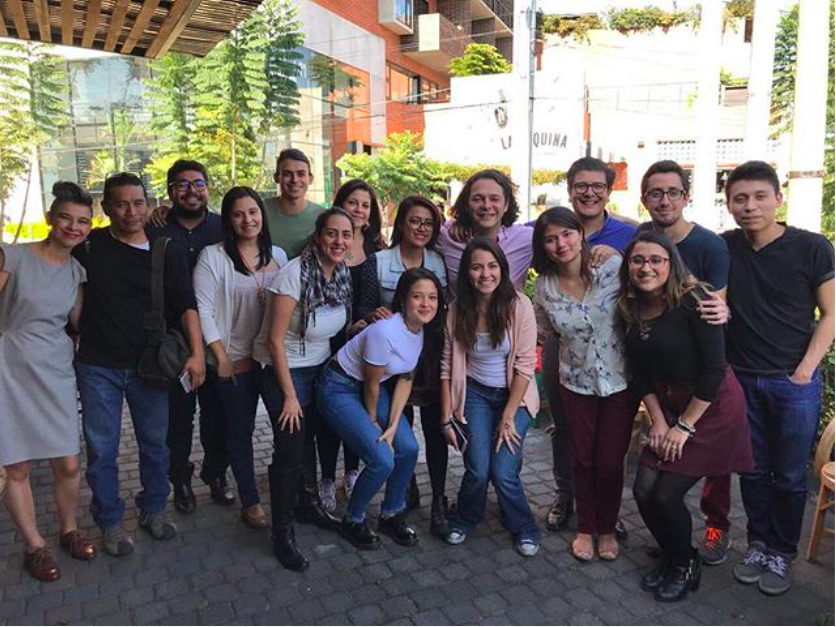How Nómada watches over democracy in Guatemala
Martín Rodríguez Pellecer is the founder and director of Nómada, an independent platform for investigative journalism. He lives and works in Guatemala, one of the toughest countries in Central America. Together with his team, he publishes critical stories about fraud, human rights violations and corruption, regularly nailing high-ranking figures to the pillory. “No, the bad guys don’t exactly love us,” he says. Martín drives an armored car and was advised to stop using his bicycle. But quitting doesn’t even enter his mind. What drives this man?
“We want people to wake up and be alert, especially young people. We want to show them how our country works. They are the next generation, with whom we have to build a better society.” Martín explains how 2015 was a turning point for Guatemala. “It was the start of the Guatemalan Spring. The Attorney General’s office and CICIG (a UN-Commission) were conducting major investigations into corruption and impunity. We covered this extensively and there were many demonstrations. The President eventually had to resign and went to jail the same day.”
Hivos was our very first donor, and we’re delighted they continue to support us.
Corruption and violence
“Guatemala has a tradition of brave journalists even in the darkest hours of our history,” Martín says. Over the past century, different dictators ruled with an iron fist. Especially between 1978 and 1985, when most of the 45,000 disappearances occurred, more than in Argentina, Chile and Uruguay combined. Since 1986, the country has in theory been a democratic republic, but human rights violations, corruption and violence are still the order of the day. Guatemala dangles near the bottom of the UN welfare index for the American continent, together with Honduras and Haiti.
Before Martín founded Nómada, he ran another online newspaper. “We thought we were doing good journalism and publishing interesting pieces. ‘Really cool’, people would say. But when I asked what they thought of a particular article, it turned out they never actually read anything. We figured out why - it turned out to be mainly in the design. It wasn’t attractive, and the articles weren’t accessible enough. So when I started Nómada in 2014, I knew it had to be completely different.”
Enfant terrible
And completely different it is. “We invest heavily in design and make sure that we explain complex things properly. This is actually a return to our journalistic roots: show what’s happening and explain what it means. Nómada is the most independent medium in Guatemala; we are a sort of enfant terrible. And we don’t just write, we also organize parties and events to bring people together in a fun way while also making them politically aware. And then we post a very cool video report so everyone can have a look. This is how we manage to keep readers on board who weren’t at all interested in politics before.
We denounce abuses, expose corrupt politicians and bring criminal practices to light.
”Nómada is doing well. “We now have a team of twenty people, of whom eight are journalists, including myself. We denounce abuses, expose corrupt politicians and bring criminal practices to light. The news and stories we make are free in order to reach as many people as possible. Our main share revenue is a content agency we created for companies; we use our design, video and storytelling skills for the market. We obtain another part of our financing from events. In addition, we depend about 40 percent on funds such as Hivos. By the way, Hivos was our very first donor, and we’re delighted they continue to support us.”
Standing ovation
Nómada has amassed a large number of readers since it started four years ago. “In Guatemala, about 5 million people have access to the internet. During our first three years, 300,000 of them came to our website every month. In 2018, this rose to about 600,000 visits a month. And occasionally you can feel the love from all those people. Last autumn, for example, Congress tried to pass a few laws to protect itself from investigations of corruption and impunity. In response, thousands of demonstrators marched towards the government building and surrounded it. They didn’t allow anyone to leave until Congress had changed the laws.” Martín calls it a fine example of “direct democracy.”
Go Nómada, go Nómada! - They gave us a standing ovation.
“We had to report on that, of course, so five of us went to a nearby coffee shop to plan our coverage. The place was packed. Suddenly, they figured out who we were and the whole group started to chant: 'Go Nómada, go Nómada!' They gave us a standing ovation. We had goosebumps all over.”
Big hack - strike back
“The popularity of Nómada is rising. But that also creates enemies. Corrupt politicians and shady businessmen campaign to discredit us. Last year that came to a boiling point when my Twitter account and all our inboxes were hacked and the Nómada website went down. There were threats coming in and we were urgently advised to get our own safety and security in order. Since then I’ve had to drive an armored car and I can’t use my bike every day. Not that it stops us. Two weeks after we were hacked, we came up with a big article about how the president took bribes from the army. We just keep going, we will not be silenced. In a few years, we will look back on these times with a big smile on our faces.”
"Fearless, fearless, fearless." In a 2015 crowdfunding campaign, Nómada's founder Martín Rodríguez Pellecer explains what's at stake.








